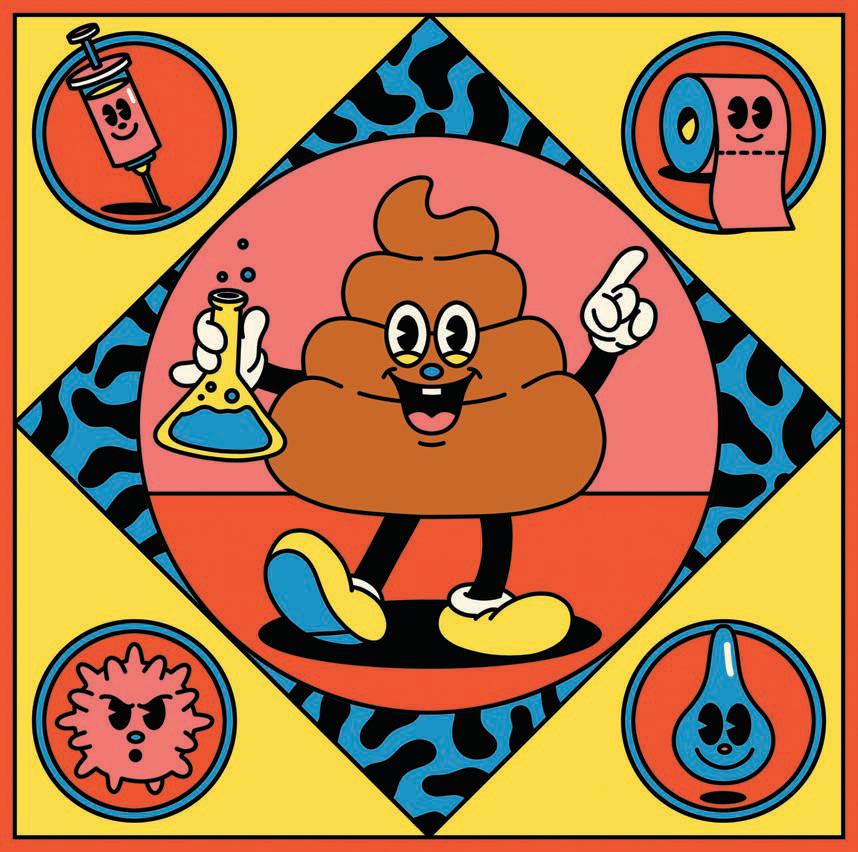LISTENING TO OUR GUTS

ONCE THE CORONAVIRUS made its human debut, it wasn't long before scientists found the virus in our poop. Fecal samples from the earliest patients, including the first known case in America, revealed people were shedding the virus not only from their noses and mouths, but also through their excrement. This would turn out to be a pivotal discovery: If the virus was in our waste, it had to be in the sewers, too. And the sewers, scientists hoped, held information about how the virus was spreading, Guy H. Palmer, a professor of pathology and infectious diseases at Washington State University, told me. "They started saying, 'We know this is in the wastewater. Can we measure it?"
The answer was a resounding yes. By sampling sewage, scientists discovered they could estimate Covid trends across communities with stunning accuracy.
"Wastewater surveillance"-the practice of monitoring sewage for pathogens, contaminants, or drugs-has since become a game-changer in the fight against Covid, particularly as at-home testing has eclipsed testing in clinics. As Palmer and his colleagues noted in a recent 151-page report for the National Academies of Sciences, Engineering, and Medicine, dozens of cities and states across the US have used sewer data to track Covid outbreaks, identify hotspots for vaccination outreach, decide where to allocate treatments like monoclonal antibodies, and serve as an early alarm for individual communities like schools or universities. In other words, the data contained in our poop has likely saved lives.
Esta historia es de la edición July/August 2023 de Mother Jones.
Comience su prueba gratuita de Magzter GOLD de 7 días para acceder a miles de historias premium seleccionadas y a más de 9,500 revistas y periódicos.
Ya eres suscriptor ? Conectar
Esta historia es de la edición July/August 2023 de Mother Jones.
Comience su prueba gratuita de Magzter GOLD de 7 días para acceder a miles de historias premium seleccionadas y a más de 9,500 revistas y periódicos.
Ya eres suscriptor? Conectar

TURNING THE TIDE
How Hawaii stopped locking girls up by starting to listen to them

"WE DON'T ACTUALLY GIVE A FUCK"
10 ways to enrich the Trumps and the MAGA movement

A CHILLING EFFECT
The Trump administration threatens polar ice research that could help save us from climate change.

CYBER SECESSIONISTS
Silicon Valley moguls are creating regulation-free, crypto-based “network states.” And hoping to gobble up land near you.

PARENT TRAP
Tech bros and “trads” are pushing women to have more babies. Just as long as they're the right kind of women.
THE NEXT GENERATION
Meet the Elon Musk fans remaking education in his image.

"TRUMP'S FAVORITE DEMOCRAT❞
Grassroots progressives used to love John Fetterman. Now they wonder what happened to him.

FARM REDUCTION
The Trump administration's assault on small farmers

ASPIES ÜBER ALLES
Elon Musk believes autism makes him superhuman. Just don't call it that.

PUNCHING ABOVE OUR WEIGHT
Thanks to you, our trophy closet is overflowing.
